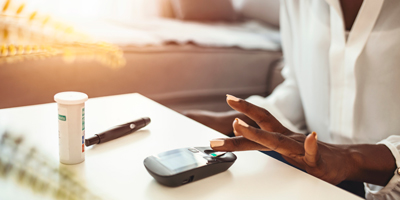It’s estimated that in the US, over 18 million people over the age of 20 have diabetes. If you happen to have been diagnosed with diabetes, make sure you’re getting all the right diabetes treatment supplies. Also check to make sure that your glucose levels are within the accepted guidelines. Take any other additional steps your physician has advised – but most of all, go out and live your life because your diabetes IS manageable!
People over the age of 45 and those who are considered obese are especially risk prone for this potentially fatal disease. Some of the potential health problems that may result are: partial to complete blindness, kidney disease, hypoglycemia and certain sexual and urological problems. These include erectile dysfunction in men.
Even though these are serious concerns and should be carefully watched for, diabetes is in fact quite manageable, especially with some of the tools we currently have to work with. For example, blood sugar monitoring devices can accurately check your blood glucose levels in a matter of seconds.
Check your levels at least daily. Depending on your particular diagnosis, you might need insulin shots to manage your blood chemistry effectively. These shots may be required several times a day. Also, be sure to have a glucogen emergency kit on hand at all times for your diabetes treatment. This is an important element that should be part of your diabetes supplies kit.
Even though diabetes is manageable, don’t make the mistake of thinking that it isn’t a serious condition that doesn’t require daily attention. It is and it does. Be sure to always keep on hand all of the supplies necessary for proper monitoring and treatment. Like the glucagons kit I just mentioned. Speaking of which, all of the medical supplies you need are available online and can be delivered to your home as needed.
- Insulin, Insulin Syringes, and Insulin Pens.
- Insulin Pump.
- Blood Sugar Meters, Blood Lancets, and Diabetic Test Strips.
- Ketone Test Strips.
- Glucose Tablets and Glucagon.
- Diabetes Food Stash.
- Diabetes Medical Alert Bracelet.
- Skin Care Supplies.
Other things you can do:
- Eat healthy foods. Choose foods lower in fat and calories and higher in fiber. Focus on fruits, vegetables and whole grains. Eat a variety to keep from feeling bored.
- Get more physical activity. Try to get about 30 minutes of moderate aerobic activity on most days of the week. Or aim to get at least 150 minutes of moderate aerobic activity a week. For example, take a brisk daily walk. If you can’t fit in a long workout, break it up into smaller sessions throughout the day.
- Lose excess pounds. If you’re overweight, losing even 7% of your body weight can lower the risk of diabetes. For example, if you weigh 200 pounds (90.7 kilograms), losing 14 pounds (6.4 kilograms) can lower the risk of diabetes.
But don’t try to lose weight during pregnancy. Talk to your provider about how much weight is healthy for you to gain during pregnancy.
To keep your weight in a healthy range, work on long-term changes to your eating and exercise habits. Remember the benefits of losing weight, such as a healthier heart, more energy and higher self-esteem.
Sometimes drugs are an option. Oral diabetes drugs such as metformin (Glumetza, Fortamet, others) may lower the risk of type 2 diabetes. But healthy lifestyle choices are important. If you have prediabetes, have your blood sugar checked at least once a year to make sure you haven’t developed type 2 diabetes.
A diabetes diagnosis means that you will probably live with the condition for the rest of your life. But it doesn’t mean the end of your life. Far from it. Millions of people live very full and complete lives despite the condition’s very real potential to bring about serious consequences to one’s well being.
And if you’re worrying that your diabetes diagnosis means that you’ll automatically be going in and out of the doctor’s office every other day – don’t. With self-discipline, a good understanding of the disease and effective diabetes treatment and monitoring techniques, diabetes becomes a very manageable condition.







Be First to Comment